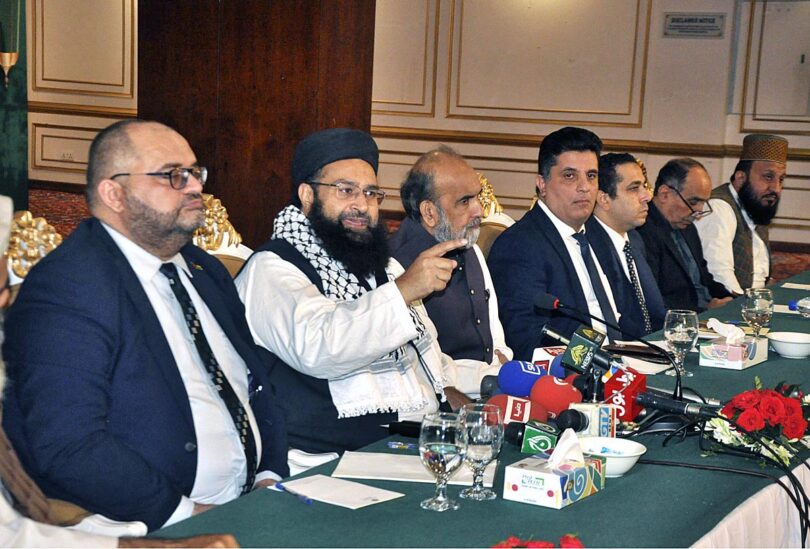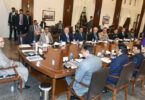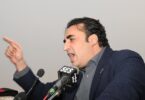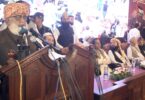F.P. Report
ISLAMABAD: Pakistan Ulema Council Chairman, Hafiz Muhammad Tahir Mahmood Ashrafi on Wednesday unequivocally expressed support for Palestine and called on the global community to acknowledge the rights of the Palestinian people.
Addressing a conference organized to express solidarity with Palestinian people under the auspicious of Pakistan Ulema Council here, he raised questions about the alleged military aggression in Syria and Lebanon and said Pakistan stood with Lebanon, Iraq, Iran, and Syria, in case of any aggression from Israel.
Ashrafi hinted that if this war continued, it would not be confined to Egypt and Lebanon, it would ultimately engulf the entire world. He called on the Organization of Islamic Cooperation (OIC) to provide a roadmap for the Palestinian cause urging everyone to break their silence, warning that “if Palestinian children are targeted today, it may be children from other regions tomorrow.” With the Presidency of the OIC now in the hands of Saudi Arabia, he expressed hope that it would take concrete steps to support Palestine.
He said this conference announced to observe ‘Martyrs of Palestine Day’ across the nation on Friday, as a mark of support for the Palestinian brethren. He mentioned that Chief of Army Staff General Syed Asim Munir reiterated Pakistan’s position in the Corps Commander Conference the other day, reemphasizing their unwavering support for Palestine.
Highlighting the enduring blockade of Gaza, he said it had been a prison for sixteen years raising questions about the incident on October 7, which he attributed to the denial of Palestinian due rights.
Ashrafi called for international human rights organizations to investigate the hospital attack in Gaza, stressing that the suffering of Muslim children remained unseen. He emphasized that children were children, regardless of their origins expressing concerns over America’s intention to cover up this disastrous incident.
He acknowledged improved relations between Saudi Arabia and Iran and Syria and Arab nations.
He reaffirmed the commitment to maintaining unity within the Ummah, rejecting any sectarian division. “We will not allow anyone to divide the Muslim Ummah based on the Shia-Sunni divide,” he stated.
He emphasized the importance of global unity among Muslims and discouraged any division, highlighting the need to stand up against imperialism and extremist groups that aimed to divide and weaken the Muslim Ummah.
Ashrafi warned that colonial powers sought to establish extremist organizations to disrupt the unity of Islamic countries, referencing bomb blasts and terrorist attacks as part of this conspiracy. He shared insights into past attempts to incite religious tensions in Pakistan, noting that the national security institutions and scholars had worked together to thwart such nefarious designs.
In his closing remarks, Ashrafi called for a boycott of Israeli products and expressed that Muslim nations should come together to protest the violence against Muslims in various regions including Kashmir, Palestine, and other parts of the world.
Palestinian Deputy Head of Mission Nader K. Alturk, expressed heartfelt gratitude towards Ashrafi and the people of Pakistan for their unwavering support for the Palestinian cause. Drawing attention to the ongoing crisis, he said at this moment, Israel was committing genocide in Gaza, underscoring the urgency of the situation.
He pointed out that the powerhouses of the world were targeting Gaza, affecting the lives of children, women, and the elderly. He lamented that Israel continued to wage a relentless war on Gaza.
Speaking of the devastation brought by Israeli aggression, he highlighted the impact on hospitals, schools, and homes in Gaza. He reiterated the desire for peace, security, and stability as the fundamental request of the Palestinian people. He raised a significant comparison, noting that the entire world was focused on Ukraine after the Russian attack, but Palestine’s plight remained unnoticed by the global community.
Alturk lamented the lack of global response to the Israeli invasion and occupation, which had been ongoing since 1948, contrasting it with the recent global attention on the Russian-Ukrainian conflict.
He emphasized that the Palestinian issue was a double standard in the international community’s conscience. He conveyed the urgent need for international support and solidarity to address the ongoing crisis in Palestine.
Council of Islamic Ideology Chairman, Dr. Qibla Ayaz said these were very difficult days not only for Palestine and Egypt but for all the civilized nations on earth.
He mentioned that the United Nations had been failure in performing its constitutional obligation to stop the Israeli aggression against the innocent people of Palestine and others. He urged the international human rights watchdogs to let the Palestinian people to live their lives with peace and prosperity on their land.
Dr. Qibla highlighted that the current situation was totally against the rules of the United Nations as in its resolutions there was no room for genocide, ethnic cleansing, madness, crime against humanity, and massacre which Israel was committing with the support of United States in Palestine.
He condemned the statement of United States Secretary of State Antony Blinken for supporting Israel through thick and thin claiming himself a Jew. He further termed Blinken’s statement against the diplomatic norms.
The conference was attended by a number of religious scholars from all schools of thought, people from all walks of life and members of foreign missions in a bid to express unity with Palestine and its people. The conference was concluded with prayers seeking peace in Palestine and unity in all ranks of Muslim Ummah on the globe. NNI







